Resonator guitars don’t get enough credit, especially when it comes to mainstream music. However, when it comes to genres like bluegrass and blues, resonators are used very frequently because of their twangy metallic sound, which suits these genres extremely well.
They always seem to take a back seat to both acoustic and electric guitars, which is unfair, since they are fascinating pieces of gear, not just when it comes to construction, but their looks as well. They always stand out, with their striking design, as well as loud, resonating sound, especially if they have an all-metal body, which is something that looks rather odd if you are seeing a resonator guitar for the first time.
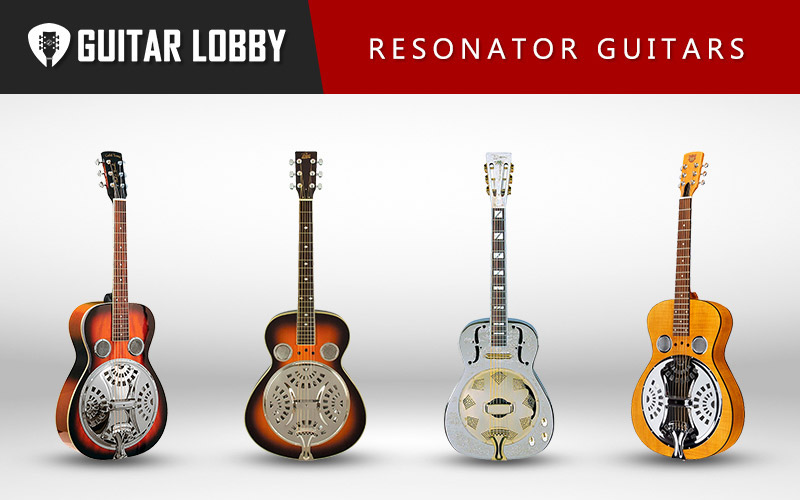
The reason why they were invented in the first place back in the late 1920s is that regular acoustic guitars weren’t able to compete with loud brass instruments within the confines of a band. Due to the unique way they are built, resonators are able to resonate more loudly and produce a sound that is grittier and sharper.
I’ll start this article by reviewing the best resonator guitars at different price points. But, if you want to learn more about all the terminology associated with resonator guitars such as spiders, cones, or biscuits I’ve included a buying guide at the bottom of the page here.
| Name of Product | Image of Product | Description | Price Range | Full Review |
|---|---|---|---|---|
| 1. Gold Tone PBR Paul Beard Signature | 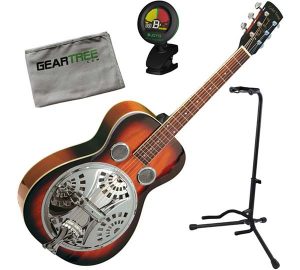 | Body: Mahogany Neck: Round Neck | $1000 | Read Full Review Below |
| 2. Gretsch Guitars G9230 | 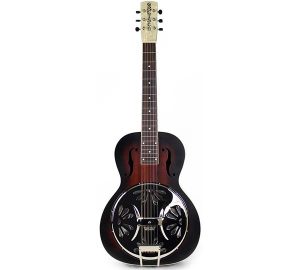 | Body: Mahogany Neck: Square Neck | $600 | Read Full Review Below |
| 3. Gretsch Guitars G9200 (Best Under $500) | 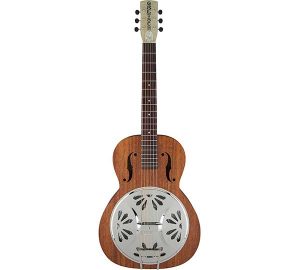 | Body: Mahogany Neck: Round Neck | $450 | Read Full Review Below |
| 4. Gretsch G9210 | 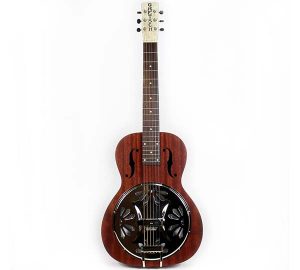 | Body: Mahogany Neck: Square Neck | $450 | Read Full Review Below |
| 5. Rogue Classic Spider | 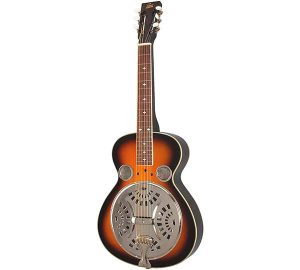 | Body: Spruce and Mahogany Neck: Round or Square | $250 | Read Full Review Below |
| 6. Dobro Hound Dog Deluxe | 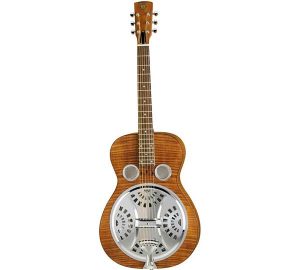 | Body: Figured Maple Ply Neck: Round Neck | $700 | Read Full Review Below |
| 7. Dean Chrome G | 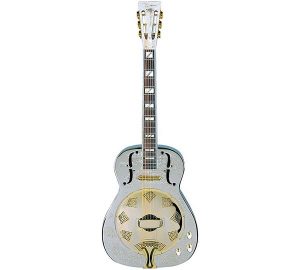 | Body: Engraved Chrome Neck: Round Neck | $870 | Read Full Review Below |
| 8. Gretsch Guitars G9201 | 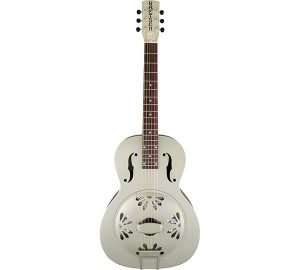 | Body: Nickel Plated Brass Body Neck: Round Neck | $700 | Read Full Review Below |
| 9. Recording King RM 991 S | Body: Nickel Plated Bell Brass Neck: Round Neck | $950 | Read Full Review Below | |
| 10. Danelectro 59 | 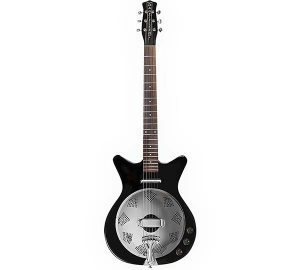 | Body: Hollow Wood Body with DPC Neck: Round Neck | $700 | Read Full Review Below |
| 11. Recording King RPH-R1-TS | 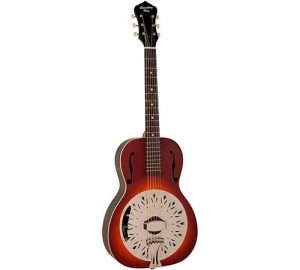 | Body: Spruce Top with White Wood Neck: Round Neck | $350 | Read Full Review Below |
| 12. Gold Tone Paul Beard Signature Series | 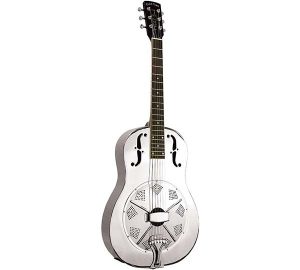 | Body: Steel Body with Brushed Aluminium Neck: Round Neck | $1000 | Read Full Review Below |
| 13. Regal RC-2 Metal Body Duolian Guitar | 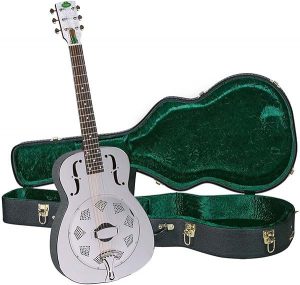 | Body: Duolian Bell Brass Body Neck: Round Neck | $860 | Read Full Review Below |
| 14. Recording King RM-997-VG Swamp Dog | 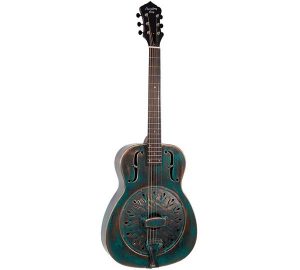 | Body: Bell Brass Body with Distressed Vintage Neck: Round Neck | $700 | Read Full Review Below |
Here Are the Best Resonator Guitars
1. Gold Tone PBR Paul Beard Signature (Best Overall)
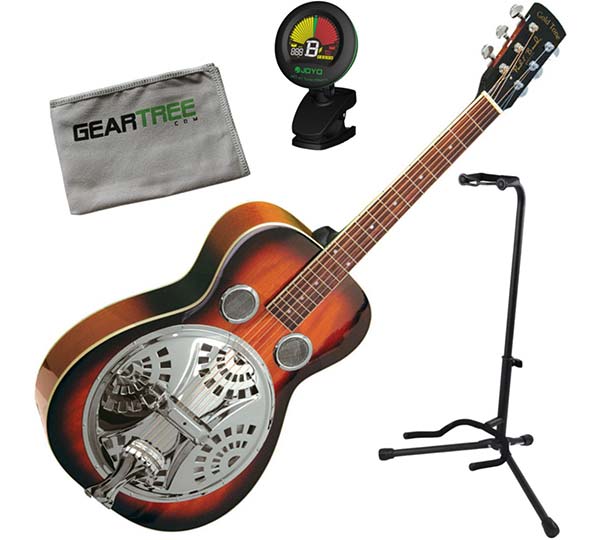
Estimated Price: $1000
Body Material: Mahogany
Neck Type: Round Neck
Resonator Style: Genuine US Made Beard Cone and Spider
Fretboard: Rosewood Fingerboard with Dot Inlays
Fret Count: 19
Scale Length: 25”
Bridge: Maple with Ebony Insert
My Review: If you are looking for a resonator guitar that will enable you to play a variety of different styles, and that is superbly crafted, then look no further than the Gold Tone PBR round neck resonator guitar. This particular resonator belongs to a top-of-the-line resonator series built by Paul Beard, so whatever you have read about this particular PBR model can pretty much be applied to any other resonator in the Paul Beard series. In terms of construction, this guitar features a mahogany body and a metal aluminum cone with a spider.
Not only does it look great, but it also gives you that signature twangy sound which is slightly on the warmer side because of the use of a single cone and mahogany wood for the body. The action on this model is high, which makes it ideal for playing with a slide or on your lap using a tone bar. However, because this is a round neck resonator, you can fret it just like any other acoustic guitar, which makes it suitable for just about any style of music, including country, blues, and bluegrass. It’s not a cheap instrument by any means, especially for a resonator, but if you are looking for excellent craftsmanship and incredible sound and playability, and you are willing to pay for it, the Gold Tone PBR round neck resonator guitar is the obvious choice. We love it.
Who Will Use This Most: It’s hard to imagine any blues, country, or bluegrass player not wanting to play the Gold Tone resonator, provided that they can afford the guitar. It’s nothing less than stellar in any kind of setting.
Bottom Line: The Gold Tone PBR resonator guitar is top-notch, and in my opinion, is the best resonator guitar under $1000.
2. Gretsch Guitars G9230 Bobtail Square-Neck (Best Value)
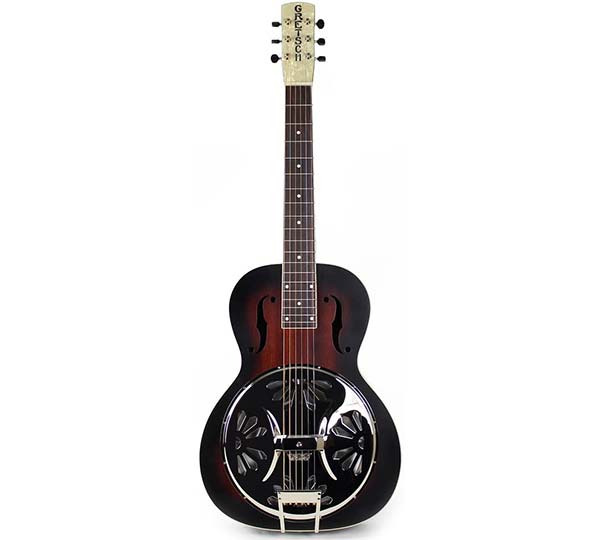
Estimated Price: $600
Body Material: Mahogany
Neck Type: Square Neck
Resonator Style: Ampli-Sonic Cone with a Spider
Fretboard: Padauk
Fret Count: 19
Scale Length: 25″
Bridge: Spider-Fishman Nashville Bridge
My Review: If there is one company out there that knows how to make great guitars that are affordable as well, that’s Gretsch. And the good news is, they are also making resonator guitars. We have selected the G9230 Bobtail square neck resonator guitar with a spider bridge as our best value pick. Priced at just under $600, this guitar is an absolute steal, especially when you take notice of the fact that this is an acoustic-electric resonator, which always adds to the price. If you prefer round neck resonators, Gretsch makes a round neck version of this beauty in the shape of the G9220. The body is made out of mahogany, and thanks to the Ampli-Sonic resonator cone which is hand-spun from pure aluminum, this guitar resonates like few others.
But, in case that’s not enough volume for you, you get to make use of the built-in Fishman Nashville piezo-ceramic pickup. This means you will be able to play this resonator both on stage, no matter how loud the other players, as well as inside the studio. The body on the G9230 features “f” holes, which are not just a nice detail, but they are also a nod to some of the classic Gretsch guitars which also feature these holes. In terms of quality, you can expect standard Gretsch quality, which means it’s really well-made, and it won’t put a huge hole in your budget. All things considered, this is the best value resonator of them all.
Who Will Use This Most: Since this a square neck resonator, it will appeal mostly to county and bluegrass players, but some blues players will find much to like here as well. Because it’s acoustic-electric, this guitar is ideal for live performances, so touring musicians will love it too.
Bottom Line: The Gretsch G9230 Bobtail acoustic-electric resonator is a fantastic square neck guitar that will provide you with that instantly recognizable twangy sound, without breaking the bank.
3. Gretsch Guitars G9200 Boxcar Round Neck (Best Under $500)
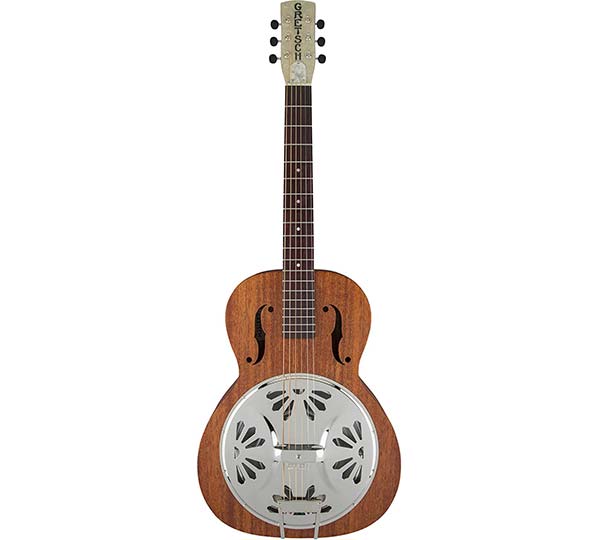
Estimated Price: $450
Body Material: Mahogany
Neck Type: Round Neck
Resonator Style: Gretsch Ampli-Sonic Spider, Spun Aluminum
Fretboard: Paduak
Fret Count: 19
Scale Length: 25”
Bridge: Spider, Ebony Tipped Maple
My Review: This is yet another Gretsch guitar, but we had to include it on our because it’s a lot of guitar for the price. The Gretsch G9200 Boxcar resonator costs a little over $400, but it feels and plays like a more expensive instrument. The body of the guitar is made out of mahogany, which provides a deep, rich tone, along with a single spun aluminum Ampli-Sonic cone design with a spider bridge. As you can tell by the title, it’s a round neck guitar, which means it will be welcomed by blues players especially. However, you can also use a slide if you prefer bluegrass or country.
The resonance of this guitar is pretty impressive, especially when you consider the fact that this guitar is small compared to the standard auditorium body shape that most resonators have. Mind you, it’s not a ¾ guitar, either. As we have mentioned before, the mahogany body gives this guitar a rich sound, but it’s also warmer than the sound made by the all-metal resonator. It has less twang in it, which might be just what you are looking for. If you enjoy playing some Delta blues and you want a well-made guitar that won’t cost an arm and a leg, the Gretsch G9200 Boxcar is an excellent choice. Gretsch has delivered another great affordable guitar.
Who Will Use This Most: Experience players and beginners alike, since it offers a lot in terms of sound, yet is cheap enough so that most players can afford it.
Bottom Line: If we were lazy, we would say that this is a great affordable resonator guitar, but that would do this guitar a disservice. It’s a great guitar, period, given its quality and sound. If you’re looking for the best resonator guitar under 500 dollars, I’d have to say this or the Gretsch G9210 Boxcar Square-Neck. It all depends if you like the round neck or square neck better.
4. Gretsch G9210 Boxcar Square-Neck
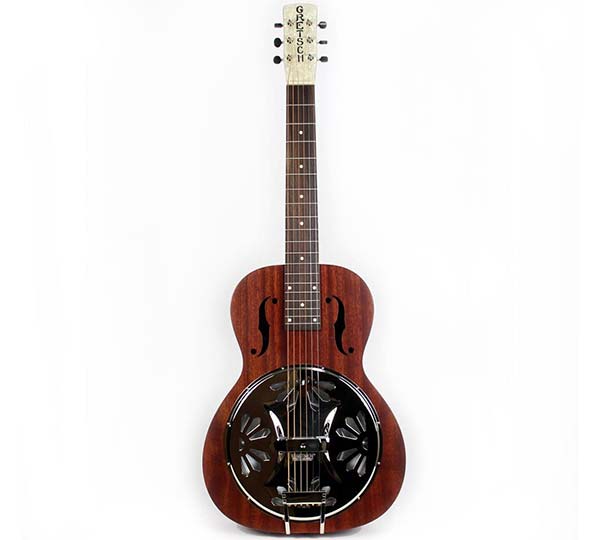
Estimated Price: $450
Body Material: Mahogany
Neck Type: Square Neck
Resonator Style: Gretsch Ampli-Sonic Spider, Spun Aluminum
Fretboard: Paduak
Fret Count: 19
Scale Length: 25”
Bridge: Spider, Ebony Tipped Maple
My Review: One of the best mid-range square neck resonator guitars on the market today is the Gretsch G9210 Boxcar resonator acoustic guitar. If you are thinking that this guitar looks familiar, you would be right, since this is basically the square neck version of the Gretsch G9200 Boxcar. There are several reasons why we have decided to put this resonator on our list. First, it’s a great guitar. Second, bluegrass players will appreciate it. And third, we think it’s important to make a distinction between different Gretsch guitars. Even though the G9200 and the G9210 are basically the same guitars, apart from the neck, that neck pretty much changes everything.
The G9210 features a mahogany body, along with a single Gretsch Ampli-Sonic Cone, and a spider bridge. This also has a smaller body than your standard acoustic. Couple that with that warm mahogany sound, and you’ve got yourself a guitar that sounds incredible. And since you will be playing this guitar with a slide, that warm sound will sound even sweeter. As in the case of the G9200, this is a well-made, affordable resonator guitar.
Who Will Use This Most: This guitar is an absolute must for bluegrass players, as well as anyone who likes to play with a slide and likes a good instrument at a great price.
Bottom Line: The Gretsch G9210 resonator is great, and if you prefer square neck guitars, this is the one to buy.
5. Rogue Classic Spider
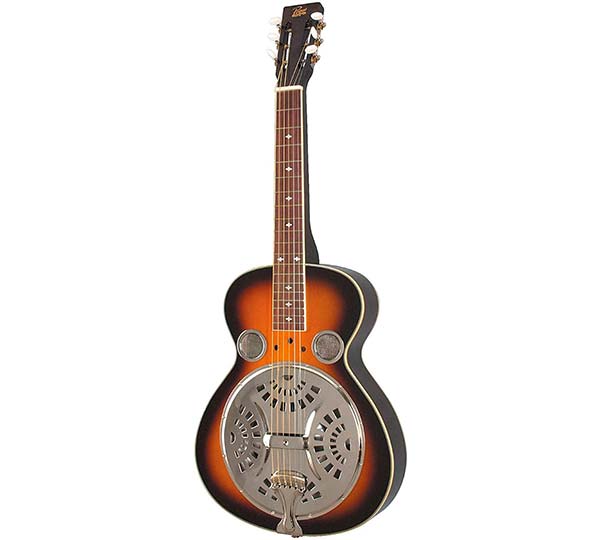
Estimated Price: $250
Body Material: Spruce Top with Mahogany Back and Sides
Neck Type: Round Neck or Square Neck
Resonator Style: 10-1/2″ Spun Aluminum Resonator with a Spider
Fretboard: Rosewood
Fret Count: 21
Scale Length: Not Available
Bridge: Die-Cast Spider Bridge
My Review: The reason why we have decided to put the Rogue Classic Spider Resonator guitar on our list is that it’s really cheap, but still a very solid, good instrument. In fact, it sounds and feels more expensive than it is, and you would be hard-pressed to find a better resonator at this price point. Decent sound and playability, as well as price, are two main reasons why this guitar is one of the most popular resonator guitars out there. Another thing that makes it attractive is that you can get as either a round neck or a square neck resonator, depending on your musical preferences. Also, apart from the regular sunburst finish, it also comes in a rather striking black finish, which will be appreciated by those looking for something more unique.
As you’ve already been able to tell, this guitar has a wooden body that has a spruce top and mahogany sides and back. Of course, for the price, you will be getting a laminate, which is not necessarily a bad thing, since those are more sturdy and tend to resonate better. We also love the cream binding, which gives this guitar a nice vintage look. The guitar itself is equipped with a 10.5” aluminum cone, which is paired up with a die-cast spider bridge. It also has a nice chrome-plated tailpiece. The neck is well-made as well, and apart from the tuners, this doesn’t feel like a regular budget guitar. As for the sound, the aforementioned combination of wood makes for a nice tone, as well as decent sustain. Overall, it’s a really good entry-level instrument.
Who Will Use This Most: Players which are looking to step into the world of resonator guitars, as well as those who are on a tight budget.
Bottom Line: The Rogue Classic Spider resonator is a great guitar for the price. We highly recommend it.
6. Dobro Hound Dog Deluxe Round Neck Acoustic-Electric with Pickup
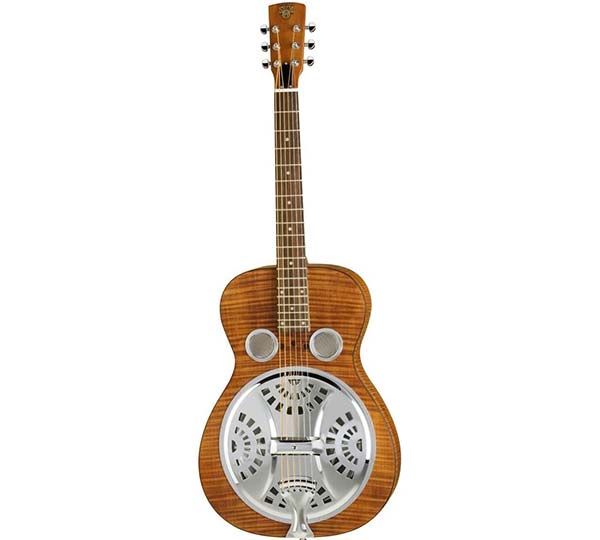
Estimated Price: $700
Body Material: Figured Maple Ply
Neck Type: Round Neck
Resonator Style: Dobro Single Cone
Fretboard: Rosewood
Fret Count: 19
Scale Length: 25”
Bridge: Spider with Ebony-Capped Maple Base
My Review: We couldn’t put together a list of best resonator guitars without including at least one Dobro guitar, which embodies the idea of a resonator so much that a lot of people think it’s a type of guitar and not a brand or model. Here we have the Dobro Hound Dog Deluxe round neck guitar, which is basically a modern version of the original Dobro built by the Dopyera brother at the end of the 1920s. The body of the guitar is made out of laminated maple, which gives it sturdiness. The resonator design implemented here is the well-known inverted cone, along with a spider bridge.
However, this vintage-style guitar has one modern update which sets it apart from its older cousins, and that is the built-in preamp system with a Fishman resonator pickup, just in case you want to play your guitar on stage in front of a live audience. When you play this acoustic-electric resonator unplugged, you can count on a twangy, gritty, and very resonant sound that is expected from a guitar and company with such a rich history. Because it’s a round neck resonator, this guitar will allow you to easily between playing with a slide, as well as fretting and strumming, just as would on a regular acoustic guitar.
Who Will Use This Most: Obviously, with the Hound Dog being an acoustic-electric guitar, it is going to appeal to musicians who prefer to take their work to the stage, but given how good it sounds, it’s a great fit for just about any blues and country guitarist.
Bottom Line: The Dobro Hound Dog Deluxe round neck resonator guitar is a fantastic piece of gear, and it lives up to the reputable Dobro name and then some. If you are looking for an excellent mid-priced resonator, you should definitely take a look at this one.
7. Dean Chrome G
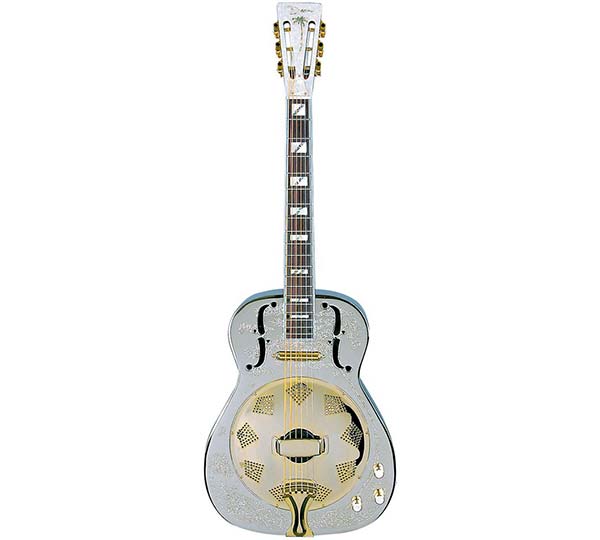
Estimated Price: $870
Body Material: Engraved Chrome
Neck Type: Round Neck
Resonator Style: Single Cone
Fretboard: Rosewood
Fret Count: 1
Scale Length: 24.75″
Bridge: Biscuit Bridge
My Review: The Dean Chrome G Acoustic-Electric Resonator is one of the most eye-catching round neck resonators you will ever come across, with its engraved chrome body, and plenty of beautiful details, such as split block inlays of the fretboard and an intricate headstock. Dean is known for making quality guitars that also look great, but they have really outdone themselves on this one. The fretboard is made out of rosewood, and inside the body, there is a single cone, along with a biscuit bridge. This guitar also has two pickups, one of which is a piezo pickup, and the other is a “lipstick” pickup. The cool thing about this particular resonator is that you can blend the sound coming from these pickups in order to achieve the desired tone.
Obviously, since this guitar has pickups, it’s an acoustic-electric resonator, which means that it will work just as well on a live stage as it would in an intimate setting. In terms of sound, the Dean Chrome G has a really raw, twangy tone that you can only get with an all-metal body. It resonates incredibly well even when it’s not plugged in, but if you do decide to plug it in, you’re in for a treat. The only thing that is less than excellent is the piezo pickup, which sounds a bit weaker when used in combination with the lipstick pickup. All things considered, this is a beautiful, premium resonator guitar that both looks and sounds great. Buying this one is a no brainer.
Who Will Use This Most: Since it’s not exactly the cheapest model, it will appeal to those with deeper pockets, as well as those who will settle for nothing less but premium instruments.
Bottom Line: The Dean Chrome G resonator is one of the finest resonator guitars on the market today and we cannot recommend it enough.
8. Gretsch Guitars G9201 Honey Dipper Round-Neck
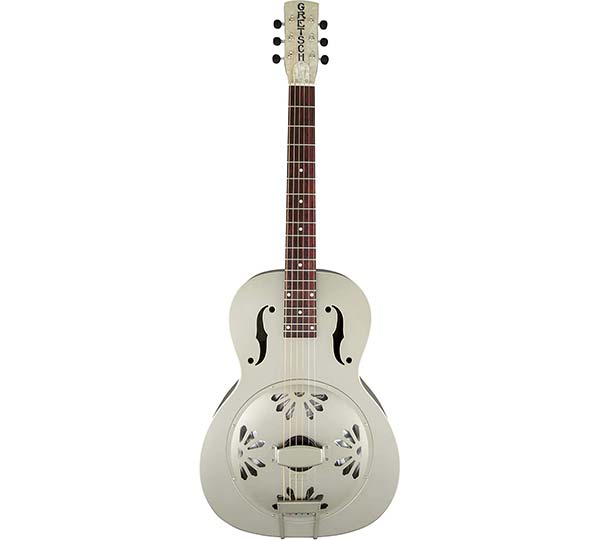
Estimated Price: $700
Body Material: Nickel-Plated Brass Body
Neck Type: Round Neck
Resonator Style: Ampli-Sonic Cone
Fretboard: Padauk
Fret Count: 19
Scale Length: 25”
Bridge: Biscuit Bridge
My Review: We have gushed about the Dean Chrome G and its looks, and we can pretty much do more of the same when it comes to Gretsch G9201 Honey Dipper resonator guitar. It’s quite simply beautiful, and it really takes you back in time, since it looks and sounds like those true vintage resonators that were built in the 1920s. In terms of specs, this is a round neck resonator, which means it’s pretty versatile and suitable for a number of genres and playing styles. When it comes to resonance, this guitar features a single Ampli-Sonic cone design, along with a biscuit bridge. However, what makes the G9201 really stand out is its all-brass body, which really sounds unique.
This resonator will perform equally well whether you are using a slide or switching between chords. Because it’s an all-metal body, you get a sound that is a bit more clanky for lack of a better word, which what this type of resonator should sound like and what it has sounded like in the past. Apart from the unique sonic qualities, the G9201 also projects really well and is quite loud, so you will have no trouble cutting through the mix, provided that some of the instruments aren’t amplified. This guitar is everything a great resonator should be and really looks the part, as well. What more could you ask for?
Who Will Use This Most: Blues players, since it’s a round neck resonator, as well as those which prefer the clanky vintage sound you can only get with an all-brass body.
Bottom Line: The Gretsch G9201 is one of the finest resonator guitars out there, and when you consider its relatively moderate price tag, you get an instrument that is a real bargain.
9. Recording King RM-991-S
![]()
Estimated Price: $950
Body Material: Nickel-Plated Bell Brass
Neck Type: Round Neck
Resonator Style: Three 6″ Recording King Cones
Fretboard: Rosewood
Fret Count: 19
Scale Length: 25.5″
Bridge: T-Bridge with Ebony & Maple Saddle
My Review: On the premium side of the segment, one of the guitars that should capture interest is the Recording King RM-991-S resonator. Now, this is a round neck resonator, but there is also a version of this guitar with a square neck, so you get to have a choice, depending on what kind of music you play. So far, most of the guitars we have featured were based on a single cone design. This one was built using the tricone design, covered with a screen which gives this guitar a really unique look and makes it different from most resonators. Another thing that stands out is the mirrored finish of the nickel-plated bell brass body, which may not dazzle everyone. We think it looks awesome nonetheless.
Each of the three six-inch cones is made out of aluminium, and all of them are connected by a T-shaped bridge. Obviously, this sort of design makes the guitar more difficult and expensive to produce, hence the steep price tag. These three cones, one of which is for treble and the other two for bass tones, produce a really warm, loud sound, and the brass body also contributes to that. However, be prepared to play this guitar hard if you want to get that loud, twangy sound. Players with a gentler touch will have to change their style to make the most of what this resonator has to offer. The RM-991-S is really well-made, and although not really cheap, it’s worth every penny.
Who Will Use This Most: Professional musicians which are willing to pay a premium price for a resonator.
Bottom Line: The Recording King RM-991 is an excellent choice if you are looking for an all-metal tricone resonator. The only thing that might stop you from buying one is the price.
10. Danelectro 59 Resonator Acoustic-Electric Guitar
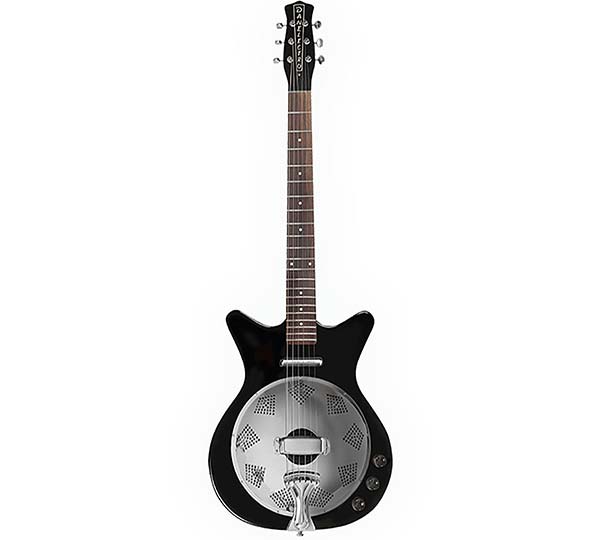
Estimated Price: $700
Body Material: ‘59 DC Shorthorn Shape Hollow Wood Body with Diamond Plate Cover
Neck Style: Round neck
Resonator Style: Single Cone with a Piezo Pickup
Fretboard: Pau Ferro
Fret Count: 21
Scale Length: 25″
Bridge: Not Available
My Review: As you have been able to see so far, most resonator guitars have a similar body shape that doesn’t feature any cutaways. Well, the Danelectro ‘59 acoustic-electric resonator guitar is different. What Danelectro have done is apply their well-known Shorthorn double-cutaway body to this resonator guitar. Even though this is a round neck resonator, so the neck is not going to be hugely thick, those cutaways do make it easier to reach those upper frets from both sides of the neck. In fact, the maple neck on this is pretty thin and sleek and similar to those found on electric guitars.
When it comes to sound, the Danelectro ‘59 resonator brings the goods, as well, since it comes equipped with a built-in piezo pickup that is hidden underneath the coverplate and inside the biscuit cone, as well as one lipstick pickup. These two pickups allow you to dial in just about any sound when the resonator is plugged in, which makes this guitar very versatile and able to cover anything from blues to bluegrass. Because of the thin neck, this resonator is a true joy if you are playing chords, and you will have no trouble playing if you prefer other playing techniques, such as fingerpicking or using a slide. When it comes to price, this is not the cheapest resonator out there, but it’s still worth every penny.
Who Will Use This Most: Players who like to switch among different styles, as well as those who play in front of a live audience.
Bottom Line: The Danelectro ‘59 resonator guitar is unique enough to capture your attention, and it has plenty of advantages that a lot of players may find essential, such as a thin neck or dual pickups.
11. Recording King RPH-R1-TS Dirty 30’s Resonator Guitar
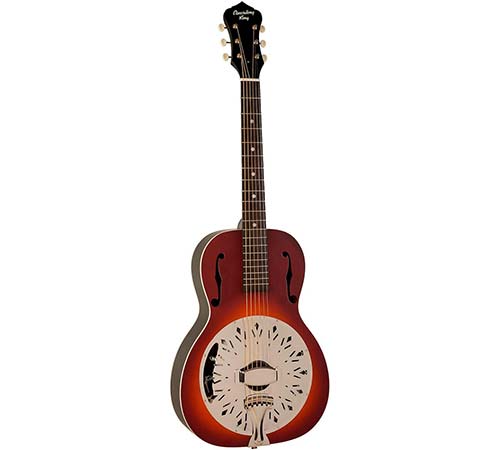
Estimated Price: $350
Body Material: Spruce Top with White Wood Back and Sides
Neck Type: Round Neck
Resonator Style: Hand-Spun 9.5″ Resonator Cone
Fretboard: Rosewood
Fret Count: 20
Scale Length: 25.4”
Bridge: Biscuit Bridge with Maple/Ebony Saddle
My Review: In case you are looking for your first resonator and don’t want to spend a ton of money, but you would still like a good instrument, the Recording King RPH-R1-TS Dirty 30’s resonator is the guitar for you. The body is made out of a combination of spruce and white wood, which should produce a tone that is softer and less gritty than the one metal resonators make. The RPH-R1-TS is a round neck guitar, which means you won’t have to stick to one music style in particular. You will be able to play them all, whether you are using a slide or a pick.
The hand-spun 9.5” resonator cone is responsible for the resonance, and it’s paired up with a biscuit bridge, and the two provide plenty of sustain, as well. You will also notice that this guitar has a couple of f-holes on its body, which are there to help produce optimal bass and treble frequencies. At this price, there are only a few guitars that can the RPH-R1-TS in terms of sound and playability. It offers terrific value, and we guarantee that you won’t regret buying one.
Who Will Use This Most: Anyone who is looking to step into the world of resonators guitars on a budget, but would still like a good instrument.
Bottom Line: The Recording King RPH-R1-TS Dirty 30’s resonator is one of the best value guitars on the market, and one you should definitely check out if you are a beginner.
12. Gold Tone Paul Beard Signature Series GRS Metal Body Resonator Guitar
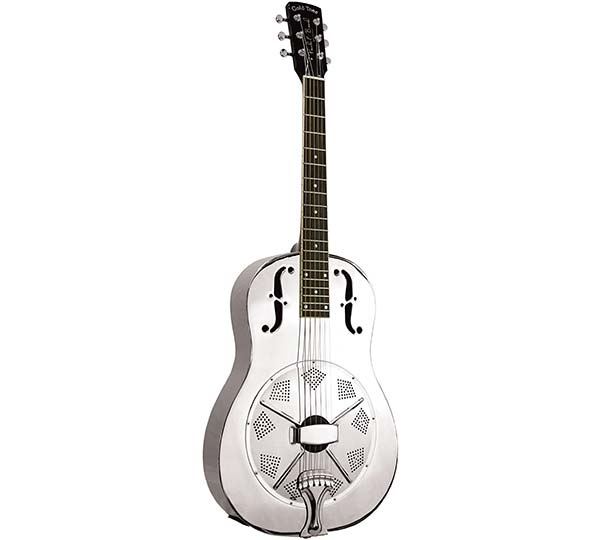
Estimated Price: $990
Body Material: Full-Depth Steel Body with Brushed Aluminium Finish
Neck Type: Round neck
Resonator Style: Brushed Aluminum Cone
Fretboard: Ebony
Fret Count: 19
Scale Length: 25”
Bridge: Biscuit, Maple with Ebony Insert
My Review: Whenever you come across a Gold Tone resonator guitar, you know it’s going to be something special. It’s also won’t be the most budget friendly compared to other options on this list since they specialize in making high-end resonators. The Gold Tone Paul Beard Signature Series GRS metal body resonator is no exception. The PBR model is the best resonator on our list, and a lot of that applies to the GRS, in terms of build quality, craftsmanship, and price. However, that is where all the similarities end, since there is a huge difference between the bodies of these two Gold Tone guitars since this is an all-steel resonator guitar.
The GRS features a reverse-cone resonator and a biscuit bridge, which shouldn’t provide epic sustain, at least in theory. However, thanks to the steel body, this guitar just keeps on coming in terms of projection and resonance. We also love a lot of the features it offers, such as the removable palm rest on the coverplate, which enables you to adjust the action of the string, string space, or even replace the bridge saddle in no time. Also, if you are a left-handed player, this model has a version for you as well. It’s a brilliant guitar, and certainly one of the best ones you can for your money.
Who Will Use This Most: Those who can afford the price tag, professional recording artists and musicians, as well as anyone looking for the perfect steel resonator.
Bottom Line: The Gold Tone Paul Beard Signature Series GRS metal body resonator is one the best resonators you can spend your money on and an instrument that any player would be thrilled to have.
13. Regal RC-2 Metal Body Duolian Guitar
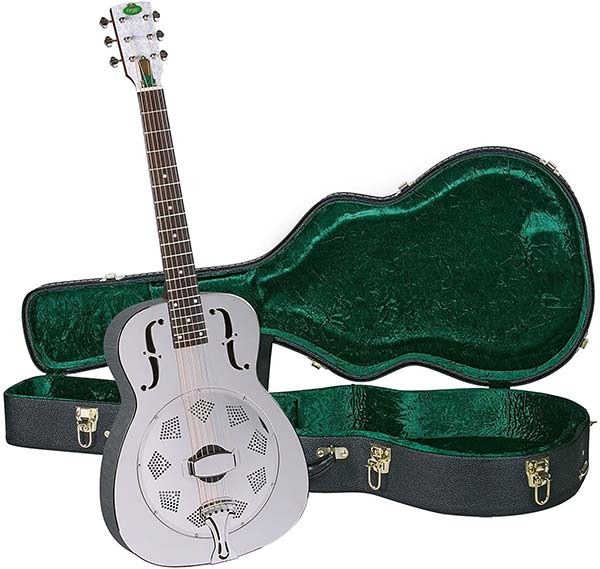
Estimated Price: $860
Body Material: Duolian Bell Brass Body
Neck Type: Round Neck
Resonator Style: Resonator 9.5″ Spun Aluminum Cone
Fretboard: Indian Rosewood
Fret Count: 19
Scale Length: 25”
Bridge: Biscuit-Style
My Review: If you want to talk about legendary resonator guitars, then we have something special in store for you: the Regal RC-2 Duolian. This resonator has been one of the most coveted and popular high-end guitars ever since it was first released in the 1930s. While the modern version does echo everything that’s great about the original, it’s not a replica, since it features some of the present-day updates, such as the fully adjustable neck and a neck joint that is set at the 14th fret. We cannot help but praise everything about its looks, from the nickel-plated finish on the brass body to the f-holes and eye-catching coverplate.
When it comes to sound, the spun resonator cone and the wooden biscuit bridge, along with that bell brass body, are responsible for making some of the most sublime resonator sounds you can imagine. The amazing tone and projection are the reason why this guitar was played by legends such as Son House and Tampa red. If you are a fan of the Delta or the Chicago blues, the Duolian is an absolute must-have for any blues plates. Or it would be if it weren’t for the price, which is not astronomical, but still too steep for most. Mind you, even at this, the quality and the sound that this resonator creates make it a bargain.
Who Will Use This Most: Those looking for a vintage-style instrument, but with a modern twist, and are willing to top dollar for superb craftsmanship.
Bottom Line: The Regal RC-2 Duolian is simply spectacular, and we have nothing more to say about it.
14. Recording King RM-997-VG Swamp Dog
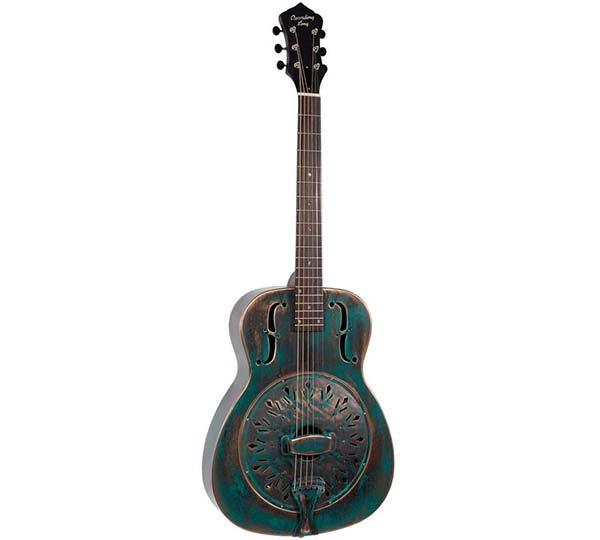
Estimated Price: $700
Body Material: Bell Brass Body with Distressed Vintage Finish
Neck Type: Round Neck
Resonator Style: Hand-Spun Resonator Cone
Fretboard: Revebond
Fret Count: 19
Scale Length: 24 7/8″
Bridge: Maple Biscuit Bridge, Ebony/Maple Saddle
My Review: If we were to rank resonator guitars based on looks alone, the Recording King RM-997-VG would certainly be the winner. Although we don’t usually dig the fake distressed/relic look, we have to say that it looks absolutely incredible on this guitar. However, do you see a metal guitar that is covered in oxidized green patina? It’s supposed to look like it has been left out on the porch, and played for decades. But, the beauty here isn’t just skin-deep, because the RM-997-VG is a high-quality instrument that features a bell brass body with a round neck, as well as the hand-spun cone and a biscuit bridge, which are in charge of sound and projection.
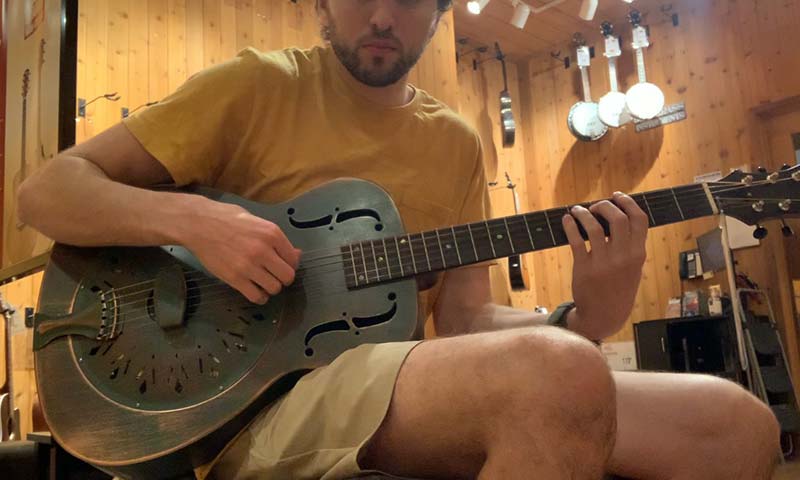
This guitar’s looks echo the pre-war resonator guitars, and its sound does more of the same, so you get an endless supply of grit and twang every time you strum the string one or use a slide on the fretboard. We have featured a couple more Recording King resonators and they are excellent, but this one might just be our favorite, just because it has so much character, even when it’s not being played. If you are into metal resonators and nothing else will suffice, then you will love the Recording King RM-997-VG and everything that it has to offer.
Who Will Use This Most: Everyone who likes something unique, as well as players who prefer the sound and the feel of vintage instruments.
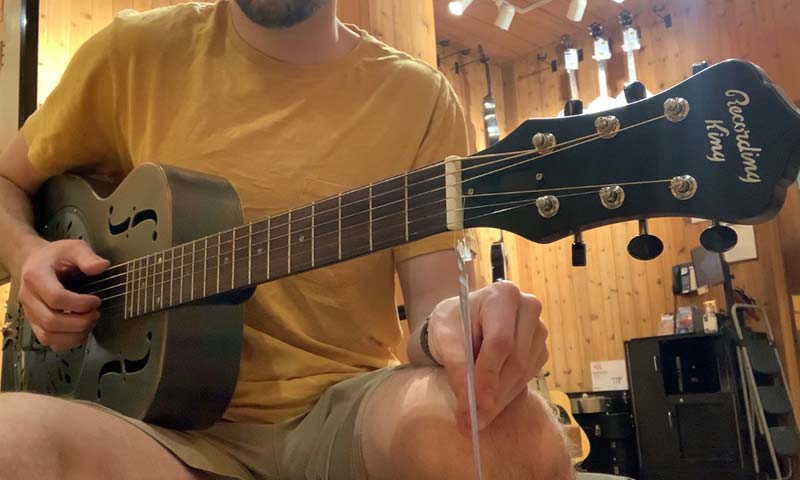
Bottom Line: The Recording King RM-997-VG round neck resonator guitar is an amazing piece of gear, and once it’s in your hands, you won’t be able to put it down.
Choosing the Right Resonator Guitar (Buying Guide)
If you know anything about guitars, you probably know that categorizing them is a very complex endeavor, since you can view them based on several different criteria, such as the type of woods used in their construction, pickups, shape, size, as well as whether they are acoustic or electric. However, there are more specific categorizations inside each of those categories, and resonator guitars are no exception. The basic construction principle is the same on all resonator guitars since they are all acoustic guitars with a metal speaker integrated inside its body.
However, the way these speakers are built and the way they resonate and carry the vibrations can be different. Also, resonator guitars are not uniform when it comes to their necks, since there are two different designs, one which is better suited for slide playing, and one which is suited for regular fretting and strumming. Finally, resonator guitars can be made out of different materials, which make the guitars sound completely different. With that in mind, let’s take a look at different resonator guitar types, what you should look out for when buying one, as well as their history and how they came to be, and along the way, all the terminology and basic principles they are built on.
Square Neck vs. Round Neck Resonators
If you are familiar with “regular” guitars, you probably know that you can choose among different neck types, based on the shape of the cross-section, which is why you have C or D-shaped necks on acoustic or electric guitars. However, the differences between neck shapes are somewhat slight, especially when compared to resonator guitars, since they only have two neck types which alter the playing experience drastically. The first type of resonator guitar based on neck type is the square neck resonator, whereas the second one is the round neck resonator.
Squareneck resonator guitars are predominantly used in genres such as country, bluegrass, as well as Hawaiian music, although they can be used in pretty much any genre if it sounds good. Unlike traditional guitars, which are fretted by one’s fingers with the fretboard facing away from the player, square neck resonators, which are also called flat neck resonators, have an extremely wide and thick neck which makes regular fretting impossible. Instead, you play them by placing them on your lap, with the fretboard facing you, and then play using a bar or a slide, much like a lap steel guitar. Also, the reason why they have gotten their name in the first place is that their necks have square edges.
The action on the square neck guitars is extremely high, which means that even if you had large enough hands to fret chords on such a chunky neck, you still wouldn’t be able to play them, since it would take too much force to reach the actual fret. And even if you could somehow do that, the tension would snap the strings beforehand. Basically, the frets on the square neck resonator guitar are just there to provide orientation for the player, and they don’t play a role in the production of sound.
Round neck resonators have a rounded neck, just like your regular acoustic guitars, usually C or D-shaped, which enables you to play them just like any other guitar. The action on round neck resonators is lower than that of square neck guitars, which means you can fret them normally, as well as play them by strumming the chords, fingerpicking, or by using a slide. This sort of versatility makes round neck resonators a lot more practical, and as a result, a lot more common than squareneck resonators.
Another advantage of a round neck resonator guitar is that it can be made to function as a square neck resonator by using a nut extender. This saves you money and allows you to carry just one guitar instead of two. But, if you can afford both, we advise you to avoid using the nut extender, since it adds a lot of tension to the next. Plus, the process is not exactly fast, so you would need to set up your guitar every time before the gig.
Wood vs. Metal
When it comes to acoustic or electric guitars, we tend to talk about what kind of wood was used for the body of the guitar, and in the case of acoustic guitars, whether it’s a laminate or solid body. Resonator guitars have bodies that are made out of wood or metal, which seems very unusual. However, since the sound on the resonator guitar is produced by the cones, which we will get to later, body material doesn’t play as significant a role as it does on acoustic, but it still influences the guitar’s tonal qualities to an extent.
Ultimately, your choice of resonator guitar will depend on your stylistic preferences. For example, resonators that have a wooden body tend to produce a warmer, fuller tone. The tradeoff is that these guitars aren’t as loud or resonant as resonators that have a metal body. Metal resonators are less versatile though since their main selling point is their characteristic metal sound and really loud projection. One thing we need to mention when it comes to resonators is that the type of wood doesn’t play as huge of a factor as it does on acoustic guitars.
On acoustics, it would be preferable to use a solid body guitar, since it sounds better and will get even better with age. However, wooden resonator guitars, even some of the top-spec models, are usually made out of laminate wood as opposed to solid tonewoods such as Sitka spruce or mahogany. The reason why: laminate wood is stronger and sturdier, and the stronger the resonator body, the louder the projection. Sure, you will find wooden resonator guitars that have bodies made out of solid wood, but that’s mainly because manufacturers want to give their guitar a premium look and a nice wood grain. The effect that the solid wood has on the sound of the resonator guitar is not significant.
Tricone vs. Biscuit vs. Spider
So, you’ve made a decision on what sort of material you want for the body of your resonator, as well as the type neck, so that’s it? Well, not exactly, since you need to choose arguably the most important factor of them all: resonator style. You’ve probably noticed that we have used strange terminology that seemingly doesn’t have anything to do with music. Spiders? Biscuits? These two, along with the tricone design, represent the three resonator styles, each with their own tonal qualities, and each producing sound in their own unique way. While there are subtle differences even among the spiders of different resonator manufacturers, for example, they produce the sound in a similar way. That being said, let’s take a look at each of these three types and explain how they work.
Tricone design is the original resonator style, and it was introduced way back in 1927. The construction involves three small ones that are made out of aluminum, which are then connected by a T-shaped bridge, which is also made out of aluminum. One of the advantages of this particular design is that it gives incredible projection and sustain, as well as one which is very rich and complex. In other words, it’s what resonator guitars are all about, and you get that with this design. The downside is that, because they feature such a complex design, these resonator guitars take longer to produce, which is reflected in their price tag.
Spider design features a single cone that is mounted inside the guitar so that it faces downwards, much like a speaker cone inside a speaker cabinet. The reason why it’s called the spider is that the cone has an eight-legged aluminum bridge fixed to it, as well as a saddle that is mounted at the top. Because of the downward-facing cone, this type of resonator guitar projects the sound directly into the outside world through the cone, instead of the sound resonating inside the guitar body first. Spider-bridge resonator guitars are great in terms of sustain. They also have a very unique tone which is somewhat nasal, which makes them ideal for genres such as country and bluegrass, where they are played with a slide.
Biscuit-bridge resonator style is the simplest of the three in terms of construction. Just like the spider design, this one also features a single cone, but here, the cone is facing upwards, and it also has a wooden disc, also known as the biscuit, hence the name. The key component here is the biscuit since it gives the resonator that signature twangy sound. The sound of the biscuit-bridge resonator guitars is just about as recognizable as it gets.
What about Acoustic-Electric Resonators?
As we have pointed out before, the reason why resonator guitars were created in the first place is the need for louder guitars that we’re able to compete with percussion and brass instruments in terms of loudness and project. Mind you, these were the late 1920s, so none of these instruments were hooked up to an amp, so the resonators did their job just fine. But, nowadays, even though they are louder than traditional acoustic guitars, they still won’t be able to cut through the mics where you have electric guitars and loud vocals. If you are considering playing your resonator on a stage or in a band, then you might want to consider getting an acoustic-electric resonator.
These resonators usually have a built-in preamp system consisting of a piezo pickup or have a single-coil pickup. They may even have a combination of the two. If you are only playing your resonator in front of your friends or where you don’t have to compete with other instruments in order to be heard, then you are better off with an acoustic resonator, since you can get a better guitar for the money you would pay for an acoustic-electric resonator. If, on the other hand, you are in a band, then you should definitely go for an acoustic-electric resonator.
History of Resonator Guitars
The history of resonator guitars begins in the early 1920s, with John Dopyera inventing the first-ever resonator, featuring the now standard design with three cones and an aluminum bridge. Resonator guitars were built out of necessity since guitar players needed their instruments to be louder. Dopyera was more than happy to oblige, in collaboration with guitarist George Beauchamp, he went on to develop other designs which were simpler and cheaper since the tricone resonators were difficult to produce.
In 1927, Dopyera and Beauchamp founded the National String Instrument Corporation and went on to build biscuit resonators under the name Triolian. Just one year later, Dopyera left the company and started a new one with four of his brothers. They named it Dobro Manufacturing Company, with Dobro being a contraction of Dopyera Brothers. Being of Slovakian heritage, they choose the word “dobro”, which means “goodness” in Slovakian.
After several years of legal struggles, the brothers managed to gain control over both companies, and in 1932, they merged it into one under the name of National Dobro Corporation. The company produced guitars until 1941. After several decades, Gibson finally bought the rights to the Dobro trademark in 1993 and has gone on to produce many resonator guitars both under the Gibson and Epiphone brands.
Some of the notable resonator players include Jerry Douglas, Rob Ickes, Eric Sardinas, Bob Brozman, and Mike Auldridge just to name a few. Players such as Chris Whitley and Mark Knopfler also played key roles in making resonator guitars more popular. Myles Kennedy of Alter Bridge is also often seen playing the resonator both live and in their music videos.
And that’s pretty much all you need to know in order to get you started. There are plenty of different resonator guitars models and manufacturers out there, and it can get pretty confusing pretty fast in case you aren’t aware of what you should look at when choosing a resonator guitar for yourself. Fortunately, now that you know what all the different resonator designs are and how they work, as well as how they should sound, you will have no trouble finding the right guitar according to your preferences, playing style, and budget. We hope that this buying guide and our list of resonator guitars will make your choice just a little bit easier. Good luck!

My name is Chris and I’ve had a passion for music and guitars for as long as I can remember. I started this website with some of my friends who are musicians, music teachers, gear heads, and music enthusiasts so we could provide high-quality guitar and music-related content.
I’ve been playing guitar since I was 13 years old and am an avid collector. Amps, pedals, guitars, bass, drums, microphones, studio, and recording gear, I love it all.
I was born and raised in Western Pennsylvania. My background is in Electrical Engineering, earning a Bachelor’s degree from Youngstown State University. With my engineering experience, I’ve developed as a designer of guitar amplifiers and effects. A true passion of mine, I’ve designed, built, and repaired a wide range of guitar amps and electronics. Here at the Guitar Lobby, our aim is to share our passion for Music and gear with the rest of the music community.

I am looking for an all metal electric square neck resonator guitar. can you help me find one?